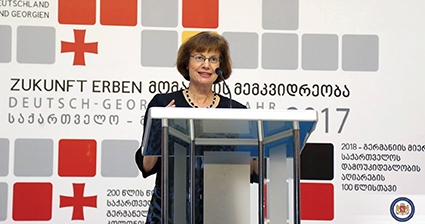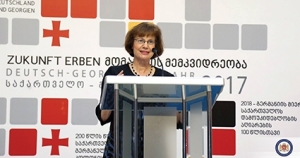Sine Qua Non of German-Georgian Relations
On May 23, the Goethe Institute hosted a discussion dedicated to the Georgian-German relations. The main sub-topic of the great event with the motto “Future Heritage”, and a presentation relating to the 200 years of bilateral relations between both nations, when the first colonists arrived in Georgia from Germany. However, the occasion proved to be far more interesting, showing that our links date back to a much earlier time.
The event was opened by Heike Peitsch, Ambassador of Germany to Georgia. The panelists were: Maia Panjikidze, former Minister of Foreign Affairs of Georgia and former ambassador of Georgia to Germany, Ortwin Hennig, former ambassador of Germany to Georgia, Alexander Kartozia, Frankfurt (Oder) Viadrina University Professor and Oliver Reisner, Tbilisi Ilia University Professor. At the head of the discussion was German journalist Silvia Stober, who often works on themes related to Georgia. They mentioned different aspects from history as well as prospects for the future. Notably, one of the main goals of the 'Georgian-German year' is to give a new impetus to projects focusing on future cooperation.
In 1817, the first German immigrants arrived in Tbilisi, who gave a birth to diverse and intense relations with Georgians. They founded two settlements: Katarinenfeld (Bolnissi) and Alexanderdorf (Assureti). They took over agriculture, including wine-making. In the 19th century, a new wave of Germans came to the Caucasian region with artistic and scientific intentions. These included architects, painters and scientists who mainly resided in Tbilisi. These years certainly left their mark: Kirche (Church) near present Marjanishvili Square, built in 1897, was demolished in 1940. However, this name is still alive, as well as Zemel, the district adjacent to Rustaveli's Metro. It was named after the pharmacist Evgeny Zemel, whose drug-store was located here.
In 1918, Germany was the first country that recognized the independence of Georgia. In 1989, Eduard Shevardnadze contributed to uniting Germany as a Minister of Foreign Affairs of the Soviet Union. In 1992, Germany restored its diplomatic relations with Georgia, opening the first embassy in Tbilisi, making our relations truly unique. Related to this, Alexander Kartozia, who was Shevardnadze’s private interpreter, remembered a humorous story: “It was in 1993, during Shevardnadze’s official visit to Berlin. Burgominister said: a Georgian man took apart Germany and another Georgian restored it. Eduard was good humorous man. Without hesitation, he answered: so, you see, there is no world politics without Georgians." Later on, Zurab Jhvania, [his pupil and former PM], said: "we promise Germany that we will not interfere in their inner politics again,” Kartozia noted, provoking cheer, also by adding that “we [Georgians], have kept out word until today.”
A fair amount of Georgians speak German and are familiar with German culture. As Oliver Reisner, Professor at Ilia State University, noted: “The German language has lost its popularity and is overshadowed by English. However, judging from the university I work at, the interest is increasing. We should encourage not only becoming German linguists but also learning German in general.” To the question, what makes him connected to Georgia, he answered: “My best half [wife]. I came here as a student in Perestroika years. Then, I returned and since 2003, I live and work here. “He is a Georgian language specialist, fluent in Georgian, ruining the myth that Germans cannot learn our language. ”There are so many more opportunities now, as there are Georgian language courses for foreigners, as well as books on the language,” Reisner noted.
Ortwin Hennig, former ambassador to Georgia, was extremely eloquent: “You have a wonderful nature and culture, but first and foremost, Georgia has wonderful people. The youth here are very intellectual, which will enable the country to find its place on the world map of tomorrow and to contribute to solving global problems. In numerous fields, Germans and Georgians collaborate very tightly, trustfully and respectfully. So, my five years of serving here are definitely amongst my best.” He also added that the German embassy has always been interested in spreading the German language. “We share very similar cultural identity: we, both nations, are fond of music, philosophy, science and poetry. These are the reasons why the interest towards the German language is so special. I am happy that after English and Russian, German occupies the third place, linguistically, in Georgia.” Hereby, Alexander Kartozia, former Minister of Education, translator and German linguist who is a professor in Germany mentioned that unlike Armenia, which was more linked with France, Georgia was always closer to Germany, which is shown by the translations too. Among renowned translators, he mentioned Nodar Kakabadze and Dali Panjikidze, as well as the linguistic researcher Guram Ramishvili. The panelists also remembered that even Kant and Hegel made reference to the Caucasus.
In his comprehensive speech, former ambassador Hennig also remembered his meetings with Shevardnadze and noted that the late President took part in the collapse of the Soviet Union and expressed hopes that one day, Georgia will recognize him as somewhat of a patriot. As news for a lot of attendees, Mr. Hennig noted that German knights also participated in the most glorious Didgori battle back in 1121, during David the Builder’s rule, which became the Sine Qua Non for the Golden Era in Georgia. This fact is much more than sufficient to prove the German-Georgian connections date back many centuries, not just the widely known 200 years.
To the pitiful remark that Germans know more about Georgia much less than vice versa, Maia Panjikidze replied: “I can tell you that for such a tiny country as Georgia, German knowledge about it is quite high.”
“It was very interesting to listen to our panelists because they [discussed] the issue [from] different angles. They pointed out that German-Georgian history does not consist of the last 200 years, but dates back to medieval ages. [These links] have reflected in German literature too,” Ms. Heike Peitsch, current Ambassador of Germany to Georgia spoke to GEORGIA TODAY following the discussion, adding that there is great potential for even more of a deepening of our special relationship.
To culminate this wonderful story of bilateral friendship, Georgia, with a status of an honorary guest, will take part in the Frankfurt Book Fair in 2018.
Maka Lomadze












